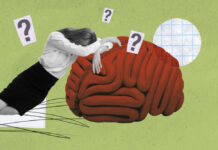A new study, published in Psychiatry Research, investigates the relationship between cumulative antipsychotic medication use and global cognition in adults diagnosed with ‘schizophrenia.’ Results of the study, conducted in Finland, suggest that long-term use of antipsychotics may harm cognitive functioning.

The authors, led by Anja Husa in the Department of Psychiatry at the University of Oulu, state:
“Based on these data higher cumulative lifetime dose-years of antipsychotics may be associated with poorer cognitive performance at the age of 43 years. It is possible that large doses of antipsychotics influence the natural course of schizophrenia in midlife, for example by preventing or attenuating cognitive recovery.”
Research has found that most people diagnosed with ‘schizophrenia’ experience neurocognitive deficits that appear to exist prior to first episodes of psychosis and are related to poorer functional outcomes. Meta-analyses have shown that antipsychotic use may improve cognitive functioning during the first few years of treatment. The authors write, “Antipsychotic medication is the foundation of treatment recommendations in schizophrenia, yet the associations of antipsychotic medication with cognition, especially in the long-term, after 5 or more years of illness, remain largely unclear.”
Previous research using the Northern Finland Birth Cohort 1966 (NFBC 1966) found that “higher lifetime cumulative doses of antipsychotic medication were associated with poorer performance at age 34 and a decline in verbal learning and memory between ages 34 and 43 years in schizophrenia.” The authors of the present study wanted to extend upon these findings to investigate the relationship between cumulative lifetime antipsychotic dose and global cognition in individuals with ‘schizophrenia’ at age 43. The authors conducted a naturalistic study, recruiting from the NFBC 1966. A cognitive test battery was given to 60 participants with ‘schizophrenia’ and 191 control subjects. The authors report on cumulative lifetime antipsychotic dose using dose-years. One dose-year is equivalent to taking a daily dose of 100mg of chlorpromazine–or a comparable antipsychotic medication and dose–for one year (e.g., taking 200mg of chlorpromazine daily for one year would equal two dose-years).
When the study was conducted, 85% of participants in the diagnosed group were taking antipsychotic medication. The average length of time that participants were diagnosed with ‘schizophrenia’ was 16.5 years and the median lifetime use of antipsychotics was 29.2 dose-years.
When controlling for gender, the age of onset, whether in remission, days spent in hospital treatment, and education level, there is a moderate correlation with between dose-years of any antipsychotic and cognitive scores (p = 0.016, β = -0.41). When school marks at age 16 are included in the equation, the correlation is no longer significant (p = 0.262). The authors note the limitation that naturalistic studies cannot determine causation. They conclude:
“In this study higher lifetime cumulative dose-years of any antipsychotics were significantly associated with poorer global cognition at the age of 43 years in schizophrenia, when the most important confounding factors related to duration and severity of illness were controlled for. However, the association did not remain when disorganisation symptoms and school marks at the age of 16 were taken into account. The cognitive effects of typical and atypical antipsychotics were similar.”
The authors state that “evidence of the benefits of antipsychotic treatment is persuasive only during the first years of illness” and many studies have raised concerns about the long-term outcomes antipsychotic medication. The authors note, “because many schizophrenia patients receive antipsychotic treatment for several years or permanently, it is imperative to study the effects of not only short-term but also lifelong antipsychotic treatment.”
****
Husa, A. P., Moilanen, J., Murray, G. K., Marttila, R., Haapea, M., Rannikko, I., … Jääskeläinen, E. (2017). Lifetime antipsychotic medication and cognitive performance in schizophrenia at age 43 years in a general population birth cohort. Psychiatry Research, 247, 130-138. http://dx.doi.org/10.1016/j.psychres.2016.10.085 (Abstract)















The benefits of antipsychotics are debatable in the short run also, given that the percentage of patients who go off the drugs is quite high, I do believe I’ve read. And the neuroleptic drugs can create the negative symptoms of “schizophrenia” via neuroleptic induced deficit syndrome:
https://en.wikipedia.org/wiki/Neuroleptic-Induced_Deficit_Syndrome
And combining the neuroleptics and/or antidepressants is medically known to create the positive symptoms of “schizophrenia,” via anticholinergic toxidrome:
https://en.wikipedia.org/wiki/Toxidrome
But since neither psychiatric drug induced syndrome/toxidrome is listed in the DSM as a possible cause of psychosis or the other symptoms of the major “mental illnesses,” these symptoms are almost always misdiagnosed as one of the billable, scientifically invalid DSM disorders. Out of sight, out of mind, right? And the “mental health professionals” all want to be paid.
I will point out that combining the antidepressants and antipsychotics (neuroleptics) is the current “gold standard” treatment recommendation for “bipolar” today.
Report comment
When I look at all of the evidence to support the idea that long-term antipsychotic use affects those taking the medications in ways that are significantly harmful and that antipsychotics seem to (at least in a significant number of cases) worsen cognitive and functional long-term outcomes in those who take the medications, I find it deeply disturbing that it’s still legal where I live (and that’s in the United States) for mental health professionals to use coercive measures to essentially force patients who’ve decided against taking these medications to take them. In discussing antipsychotic medications, some of the strongest supporters of the coercive use of these pharmaceutical agents hardly mention the negative effects of the medications if they even mention such effects at all and mostly just emphasize that the medications tend to demonstrate clinical efficacy, at least in the short-term alleviation of certain symptoms of schizophrenia and related mental conditions. Rarely do these supporters of coercive antipsychotic medication use discuss older research that shows that subgroups of patients with schizophrenia respond poorly to antipsychotics, rarely do they make any mention of the high dropout rates in clinical trials that evaluate antipsychotics for their effectiveness and safety/tolerability, and almost never do they balance the positive things that they say about antipsychotics with the growing body of evidence to support the idea that long-term antipsychotic use oftentimes is harmful. I think that the authors of the study that’s discussed in the article that I’m commenting on did a good job of summarizing the evidence to support the idea that long-term antipsychotic use can be harmful in their “theoretical discussion” here: http://www.psy-journal.com/article/S0165-1781(16)30589-3/fulltext#s0095
I’m not making the argument that antipsychotic medications don’t ever have beneficial effects or that they shouldn’t ever be used in the treatment of schizophrenia and related mental conditions, but what I am saying is that I think that there’s enough evidence to support the idea that the use of these medications (especially in the long term) can be and sometimes is harmful and that some of this harm comes in the areas of cognition and function, which are things that psychiatric treatments are intended to improve and not worsen. So basically, at least in certain cases, and at least as far as certain symptoms and certain outcome measures are concerned, I’m saying that there’s enough reason to believe that antipsychotic medications in some ways do the opposite of what they’re intended to do. And for this reason, when a patient evaluates the potential benefits and potential risks of antipsychotics and decides against taking the medications because of their risks, mental health professionals, the government, and the judicial system ought to respect this decision and also offer a range of alternative treatment options wherever possible.
Report comment
“Antipsychotic drugs could shrink patients’ brains
Experts say findings should not dramatically change current prescription practices. ”
http://www.nature.com/news/2011/110207/full/news.2011.75.html
“According to the latest findings, the more antipsychotics patients receive, the more likely they are to have a decreased amount of grey matter.”
Report comment
it is imperative to study the effects of not only short-term but also lifelong antipsychotic treatment.”
VS
it is imperative to study the effects of a drug free treatment. Give people a lawyer, tell them the crime they are accused of , before drugging them.
Report comment
Alcohol affects brain fuction and neuroleptics affect brain function the same way as cigarette smoking affects cardiovascular function – this is well known. But I’m sure that it’s possible to reduce drugs right down to a minimal damage point.
Neuroleptics also disable. Most Psychiatric disability is caused by drugs, and if the drugs were safely reduced, the consumer might be able to regain their place in life.
The overdrugging fits in with illness dependency, Rebound reaction and a longterm psychiatric patient life.
Report comment
There’s a strong chance they aren’t even capable of measuring patients performance or cognition properly.
I’d also like to see some studies done on normal citizens. There are plenty of normal non schizophrenics who receive these drugs. What do you say we take a group of 200 individuals not diagnosed with any mental disorder, including a group with high IQ of 130 or more, and some average high IQs of 125 with PhD college educations, and find out what these damn murder drugs really do to people. Drugging should go on for 10 years for each group to study long term effects in healthy subjects at high dosage. No longer will they get to claim the subjects mental illness was responsible for the decline in functioning.
We need a method of testing developed to record real world functioning and performance under stress and demanding conditions to show how daily life and functioning is impaired. There should be batteries of testing done to test memory and cognition over hours of time to see if break downs start happening in those drugged and damaged worse. The reason is I’m already aware that many Neuro psych tests today are so primitive and easy to get through that most people can have a severe disability or impairment (TBI/CTE/concussion) yet get through testing and have it not show up. Working memory, short term memory, long term memory, visual and auditory memory, vocabulary, specific skills all can be wiped out with the drugs but for some reason the studies don’t seem to have any awareness of it which helps them cover up the damage they caused. Using fMRI/interferometry/EEG to make recordings of brain functions before and after drug usage should be done as well to detect changes that can only be observed functionally but hard to detect. You also have all sorts of biophysical issues that arise that all seem to get covered up by research studies and doctors we need carefully trained whistleblower doctors to be involved to help report on the real symptoms along with new medical tests (fMRI/interferometry/EEG/EMG) to record body/neuron/organ/muscle/gland functioning before and after.
https://www.obamasweapon.com/
Report comment
It is very simple. Those who want the drug should get it, those who do NOT want the drug have the right to refuse.
Report comment
Read my comment above if you want to know what neuroleptics do to a person with an IQ above 130. They create the negative and positive symptoms of “schizophrenia” via both neuroleptic induced deficit syndrome and anticholinergic toxidrome.
Report comment
My IQ has been formally tested by psychotherapists on three occassions.
At age 13, during a psychiatric intake at a private hospital, after being tested at 2am, the doctors announced to my parents that I was above average at 104! My parents were appropriately dismayed, thankfully, and never judged me for a 2:00 AM IQ score.
At age 14, during testing for the Honors program in middle school, I was tested during daylight, non-crisis hours and found to be 119.
At age 26, as part of psychological testing for college, it was calculated by my current PsyD to be 129.
However, my last test was before I spent years on antipsychotic medication. I can say for certain that during the time I took Latuda, I could not even sit for a test. I attempted to once but the questions were maddeningly confusing – especially sequence-prediction. I would be curious, at this point, at nearly 38 and off meds entirely, to find out what’s left of my intelligence. I’d like to think that I could still bring in a solid 120.
However, my short answer is that medicating bright people into a stupor is a crime against humanity and almost certainly results in some long-term loss of cognitive abilities.
Report comment
In other news, being hit on the head with a frying pan can cause bruising and head injury.
Report comment
Old news, but good to see it published in one of the enemies house magazines
Report comment